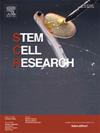利用CRISPR/Cas9技术在人iPSCs中培养ABCA7敲除纯合子细胞系AHMUCNi002-A
IF 0.8
4区 医学
Q4 BIOTECHNOLOGY & APPLIED MICROBIOLOGY
引用次数: 0
摘要
ABCA7位于19号染色体上,编码atp结合盒转运体。ABCA7的功能丧失变体与阿尔茨海默病的风险增加有关。为了探索ABCA7缺失在阿尔茨海默病发病机制中的作用,利用CRISPR/Cas9基因组编辑技术在人诱导多能干细胞(hiPSCs)中产生ABCA7纯合子敲除。由此产生的ABCA7敲除细胞系表现出正常的多能性、稳定的核型和向所有三种胚层分化的能力。本文章由计算机程序翻译,如有差异,请以英文原文为准。
Generation of a homozygous ABCA7 knockout cell line (AHMUCNi002-A) in human iPSCs using CRISPR/Cas9
ABCA7, located on chromosome 19, encodes an ATP-binding cassette transporter. Loss-of-function variants of ABCA7 are associated with an increased risk of Alzheimer’s disease. To explore the role of ABCA7 deficiency in the pathogenesis of Alzheimer’s disease, CRISPR/Cas9 genome-editing technology was utilized to generate a homozygous ABCA7 knockout in human induced pluripotent stem cells (hiPSCs). The resulting ABCA7 knockout cell line exhibited normal pluripotency, a stable karyotype, and the ability to differentiate into all three germ layers.
求助全文
通过发布文献求助,成功后即可免费获取论文全文。
去求助
来源期刊

Stem cell research
生物-生物工程与应用微生物
CiteScore
2.20
自引率
8.30%
发文量
338
审稿时长
55 days
期刊介绍:
Stem Cell Research is dedicated to publishing high-quality manuscripts focusing on the biology and applications of stem cell research. Submissions to Stem Cell Research, may cover all aspects of stem cells, including embryonic stem cells, tissue-specific stem cells, cancer stem cells, developmental studies, stem cell genomes, and translational research. Stem Cell Research publishes 6 issues a year.
 求助内容:
求助内容: 应助结果提醒方式:
应助结果提醒方式:


